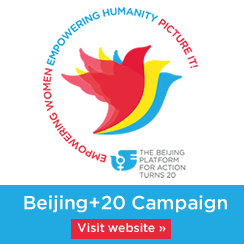UN roles and responsibilities
The 1997 agreed conclusions of the Economic and Social Council (ECOSOC) stated that in order to ensure effective implementation of the strategic objectives of the Beijing Platform for Action, the United Nations system should promote an active and visible policy of mainstreaming a gender perspective. Since 1997, ECOSOC has issued a series of resolutions pertaining to gender mainstreaming (view the list) which provides further guidance on mainstreaming a gender perspective into all policies and programmes in the United Nations system.
The United Nations System Chief Executives Board for Coordination (CEB), —which brings together the executive heads of 29 UN system programmes and specialized agencies, including the World Bank and the International Monetary Fund (IMF), —adopted the United Nations system-wide policy on gender equality and the empowerment of women in resolution 2006/2, committing to coherent and coordinated implementation of the gender mainstreaming strategy adopted by ECOSOC in 1997. The CEB also committed to providing strong leadership within their organizations to ensure that a gender perspective is reflected in all organizational practices, policies and programmes.
Through its founding resolution 64/289, the General Assembly charged UN Women with leading, coordinating and promoting the accountability of the UN system in its work on gender equality and the empowerment of women, including through system-wide gender mainstreaming. UN Women provides guidance and technical support to all Member States, across all levels of development and in all regions, at their request.
Similarly, the Quadrennial Comprehensive Policy Review of operational activities for development of the UN system, in resolution 67/226, welcomed the creation of UN Women and called upon all organizations of the United Nations development system to continue working collaboratively to enhance gender mainstreaming.
UN Women works to ensure that the principles of gender equality are consistently embedded in all development, peace and human rights agendas. As part of UN country teams, UN Women leads and coordinates the United Nations system’s work on gender equality and the empowerment of women, under the overall leadership of the UN Resident Coordinator. We also develop reporting mechanisms and ensure coherence and coordination between gender equality norms and programmes. In some areas UN Women leads. In others, it supports entities with established track records.
At the same time, senior management for each UN entity is responsible for implementing gender mainstreaming within their organizational mandates, and ensuring that policies and programmes contribute to achieving gender equality. Many have made gender training mandatory for all staff and personnel and/or established gender units and gender focal points to provide advice, and promote and monitor efforts.
A strong, continued commitment to gender mainstreaming is one of the most effective ways for the United Nations to promote gender equality at all levels, be it in research, legislation, policy development and programmes on the ground, and to ensure that women as well as men can influence, participate in and benefit from development. There is a continued need, however, to complement gender mainstreaming strategy with specific targeted activities focused on addressing particular gaps in gender equality and empowerment of women.
